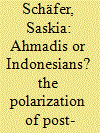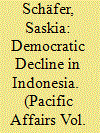| Srl | Item |
| 1 |
ID:
157939


|
|
|
|
|
| Summary/Abstract |
Since the fall of Suharto in 1998, Indonesian public discourse about “mainstream” Muslim identity and practice has polarized sharply into various factions. This article offers a detailed analysis of a subset of this discourse that focuses on the Ahmadiyya in order to grasp how the new normative contours of Islam are being shaped in Indonesia. I make three arguments: First, the discourse is homogenizing what was once a wide spectrum of identitarian positions, and that consequently, Islamic diversity in Indonesia is shrinking. Second, the various internally homogenized sets of arguments for and against the Ahmadiyya mis-engage with each other in a way that produces social fragmentation and further polarization. Third, these arguments produce exclusionary mechanisms that reinforce each other. Both the opponents of the Ahmadiyya and their defenders exclude Ahmadis from conceptions of an Indonesian “majority.” This dynamic in Indonesian public discourse has resulted in the acceleration of the marginalization of the Ahmadiyya within an increasingly fragmented Indonesian society.
|
|
|
|
|
|
|
|
|
|
|
|
|
|
|
|
| 2 |
ID:
165724


|
|
|
|
|
| Summary/Abstract |
The Council of Indonesian Islamic Scholars (MUI) has exerted increased political influence in Indonesian politics since the fall of Suharto. Constituted by representatives from various Muslim civil society organizations, the Council was originally intended by Suharto to serve as a political representative for Indonesia’s two largest civil society organizations, the Muhammadiyah and the Nahdlatul Ulama. This article argues that in addition to its own non-democratic structures and its fatwas opposing democratic values, the MUI has contributed to Indonesia’s democratic stagnation and decline in two ways: by undermining the authority of elected state representatives through its anti-pluralist stance and its epistocratic claims, and by imperiling the fragile but functioning balance of religion and the state through its undermining of the long-established religious civil society organizations.
|
|
|
|
|
|
|
|
|
|
|
|
|
|
|
|